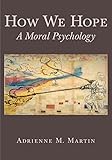How We Hope : A Moral Psychology / Adrienne Martin.
Material type: TextPublisher: Princeton, NJ : Princeton University Press, [2013]Copyright date: ©2013Edition: Course BookDescription: 1 online resource (168 p.)Content type:
TextPublisher: Princeton, NJ : Princeton University Press, [2013]Copyright date: ©2013Edition: Course BookDescription: 1 online resource (168 p.)Content type: - 9780691151526
- 9781400848706
- Hope
- PHILOSOPHY / Ethics & Moral Philosophy
- Ariel Meirav
- Luc Bovens
- Philip Pettit
- challenge cases
- challenge
- decisions
- despair
- disappointment
- faith
- good life
- guilt
- hope against hope
- hope
- hopeful activities
- hopeful imaginations
- human emotion
- human motivation
- incorporation analysis
- indignation
- influence
- interaction
- interpersonal hope
- interpersonal relations
- motivation
- normative expectation
- normative hope
- orthodox definition
- participant stance
- philosophical inquiry
- philosophy of psychology
- practical justifications
- rational action
- rational choice
- rational deliberation
- rational hope
- rational justification
- reactive feelings
- reflective human consciousness
- religious faith
- resentment
- secular faith
- self-reflection
- subjective probability estimate
- suicide
- sustenance
- syndrome analysis
- trial
- unimaginable outcome
- 128 23
- BD216 .M37 2017
- online - DeGruyter
- Issued also in print.
| Item type | Current library | Call number | URL | Status | Notes | Barcode | |
|---|---|---|---|---|---|---|---|
 eBook
eBook
|
Biblioteca "Angelicum" Pont. Univ. S.Tommaso d'Aquino Nuvola online | online - DeGruyter (Browse shelf(Opens below)) | Online access | Not for loan (Accesso limitato) | Accesso per gli utenti autorizzati / Access for authorized users | (dgr)9781400848706 |
Frontmatter -- Table of Contents -- Acknowledgments -- Introduction. What is Hope? -- 1. Beyond the Orthodox Definition of Hope -- 2. Incorporation -- 3. Suicide and Sustenance -- 4. Faith and Sustenance without Contingency -- 5. Normative Hope -- Conclusion. Human Passivity, Agency, and Hope -- Index
restricted access online access with authorization star
http://purl.org/coar/access_right/c_16ec
What exactly is hope and how does it influence our decisions? In How We Hope, Adrienne Martin presents a novel account of hope, the motivational resources it presupposes, and its function in our practical lives. She contends that hoping for an outcome means treating certain feelings, plans, and imaginings as justified, and that hope thereby involves sophisticated reflective and conceptual capacities. Martin develops this original perspective on hope--what she calls the "incorporation analysis"--in contrast to the two dominant philosophical conceptions of hope: the orthodox definition, where hoping for an outcome is simply desiring it while thinking it possible, and agent-centered views, where hoping for an outcome is setting oneself to pursue it. In exploring how hope influences our decisions, she establishes that it is not always a positive motivational force and can render us complacent. She also examines the relationship between hope and faith, both religious and secular, and identifies a previously unnoted form of hope: normative or interpersonal hope. When we place normative hope in people, we relate to them as responsible agents and aspire for them to overcome challenges arising from situation or character. Demonstrating that hope merits rigorous philosophical investigation, both in its own right and in virtue of what it reveals about the nature of human emotion and motivation, How We Hope offers an original, sustained look at a largely neglected topic in philosophy.
Issued also in print.
Mode of access: Internet via World Wide Web.
In English.
Description based on online resource; title from PDF title page (publisher's Web site, viewed 30. Aug 2021)


